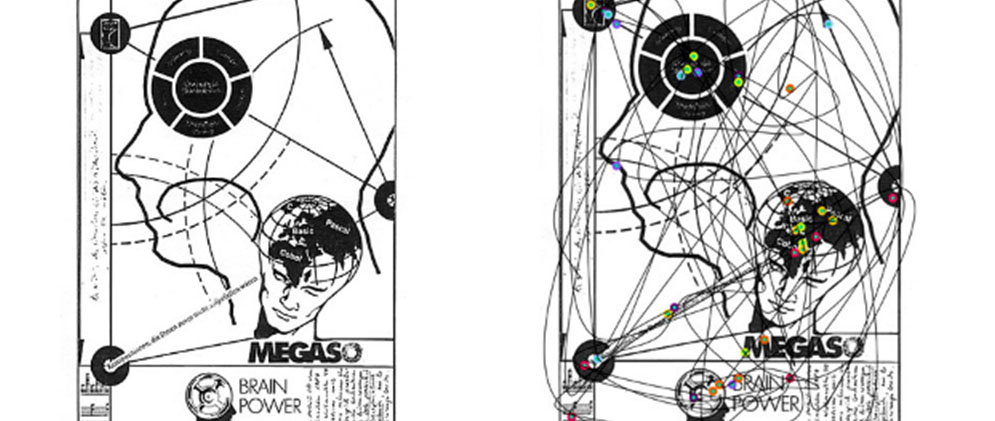Spatial Meaning Constraints in Visual Language Reading
From The Theme
SOCIAL AND COMPUTING SCIENCES
WHAT IF
What if we could study how people process text and images in order to better understand the parameters of visual language?
WHAT WE SET OUT TO DO
We set out to explore the perceptual constraints available for processing meaning from the textual and spatial features of visual language. We developed a set of eye-tracking studies, in which subjects self reported their flow of attention over a select set of “visual poems” or text-based images. Our aim was to reveal the visual variables that guide spatial meaning construction in visual texts.
WHAT WE FOUND
Our subjects’ reports of their viewing behavior while reading visual poetry show consistency across readings. Patterns in “eye paths” for an image, such as uniformities in sequence or direction, demonstrate the constraint potentials of the visual text, as well as the different meaning making styles and strategies between subjects. Approaching human visual information processing as a reading of both text and space helps improve the design and development of graphic and user interface technologies.
LEARN MORE
Prohm, Alan “Attention Tracking: Some Empiricism for a Visual Poetics” (adapted from a chapter of Visual Poetics: Meaning Space from Mallarme to Metalheart, Stanford PhD Dissertation, 2004)
PEOPLE BEHIND THE PROJECT
 Barbara Tversky is a Professor Emerita of Psychology at Stanford University and a Professor of Psychology and Education at Teachers College, Columbia University. Dr. Tversky specializes in cognitive psychology and is a leading authority in the areas of visual-spatial reasoning and collaborative cognition. Dr. Tversky’s additional research interests include language and communication, comprehension of events and narratives, and the mapping and modeling of cognitive processes. Dr. Tversky has served on the faculty of Stanford University since 1977 and of Teachers College, Columbia University since 2005.
Barbara Tversky is a Professor Emerita of Psychology at Stanford University and a Professor of Psychology and Education at Teachers College, Columbia University. Dr. Tversky specializes in cognitive psychology and is a leading authority in the areas of visual-spatial reasoning and collaborative cognition. Dr. Tversky’s additional research interests include language and communication, comprehension of events and narratives, and the mapping and modeling of cognitive processes. Dr. Tversky has served on the faculty of Stanford University since 1977 and of Teachers College, Columbia University since 2005.
 Alan Prohm is a Berlin based artist-theorist-educator. He received his PhD in Comparative Literature from Stanford University in 2004, with a focus on embodiment theory, intermedial art and experience poetics. He has taught art, literature and visual communication theory in Universities in the US, Finland and Germany. Since 2012, he has served as Creative Director for Concept at Zweimaleins GMBH in Berlin.
Alan Prohm is a Berlin based artist-theorist-educator. He received his PhD in Comparative Literature from Stanford University in 2004, with a focus on embodiment theory, intermedial art and experience poetics. He has taught art, literature and visual communication theory in Universities in the US, Finland and Germany. Since 2012, he has served as Creative Director for Concept at Zweimaleins GMBH in Berlin.
